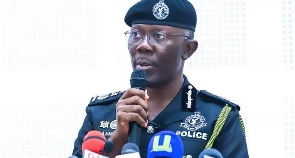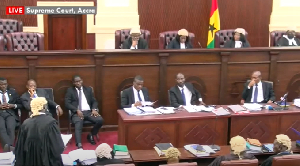Opinions of Sunday, 17 September 2023
Columnist: Delali Kojo Tsikata
The leaked tape to allegedly oust the IGP, it's impact on internal security and the Police Service of Ghana
Safe to say; Ghana is gambling with its internal security issues. How in God's name did it become relevant for any individual let alone persons required to know better, senior police officer in active service for that matter, to agree to have a private meeting or to be invited to a private meeting and attend a private meeting to have discussions on issues relating to possible ways to oust the Inspector General of Police (IGP) of Ghana premising same on the poor handling of the police service, allegedly as evidentiary proof to the President of Ghana for the removal of the Inspector General of Police.
Ironically, many individuals in this country a few of whom are well experienced in National security matters are lip-tight on the repercussions of these unfortunate developments on the security of the country.
In my considered opinion, to the extent that it is currently obvious as established by the confession and admission by these senior police officers that politicians and politicians have infiltrated the police service, we are all in trouble.
Professionalism in the police service is dead. What is worse is the worrying attitude and strange understanding of these issues by most police officers who regrettably describe this disturbing, creepy, and strange phenomenon as normal. I am left with no choice but to firmly believe that these police officers are not conversant with Act 350 and its relevant provision regulating conduct in the police service.
The police service in Ghana is part of the public service and by the combined reading of Articles 190, 200, 94, and Act 350, just to list a few, persons working in the police service are required to be legally minded in respect of their professionalism, function, code of conduct, and the repercussions thereof.
The public service is not a political party Headquarters neither is it an extention of a political party succession plan development institution.
The public service is an established institution by law where serious-minded, well-skilled, and educated individuals are lawfully recruited by the state to work. It is an establishment where Pains taken efforts by public servants are invested in international security policy development to accelerate the growth and development of this great country.
As a result, the current unfortunate development in the police service requires answers to the following questions; What does it mean to say public servants are not required to engage in politics? And What are the legal implications of that statement?
A decade ago, the Ghana police service as an establishment suffered what is generally known as an institutional identity crisis. Years ago, many individuals in this country and abroad lost confidence in this institution.
The Ghana police service once upon a time struggled with difficulty to distancing the service from a series of crimes committed in the country not because it engaged in these unfortunate crimes but because some staff in the service were identified or seen either leading armed men to rob innocent citizens or caught selling guns to armed robbers.
More often than not, these bad policemen and women who for whatever reason engaged in inappropriate conduct, independent of their function and in the complete divorce of their oaths of office, made it easy for the Ghanaian to lose trust in the police Service.
Unfortunate comments from the public such as; I cannot trust the police, I am better off handling criminal issues and activities by myself as opposed to reporting the same to the police were but a few of the comments reflecting the belief system of the Ghanaian.
During that same period, ex-president Rawlings characterized the true state of the police in his public statement: I am too comfortable with the Army but not the police. His statement gave the Police Service a wake-up call.
As a result, Pains made efforts by security, legal, human resource, psychologist, managerial, institutional, and notable foreign experts who worked assiduously to restore the image of the police service.
Today, as a result of the hard work of the aforementioned team of experts, the Ghana Police Service is arguably among the best ten police services in Africa.
Provision of a new legal regime to regulate conduct in the Service, provision of equipment, provision of arms and ammunition, regular training for all staff, standardized police training school, compulsory swimming training exercise for staff in the service, proper intelligence gathering, etcetera are but a few of the notable remarkable changes associated with the current positive image of the police Service.
It will interest readers to know that, the current police service in Ghana can boost of the state-of-the-art forensic lab for its activities that can be likened to labs in countries like South Africa, Nigeria, and Kenya.
What is more, issues in respect to inadequate bulletproof outfits, outmoded guns, old rapid response accouterments, and the lack thereof, are a thing of the past.
The current police service is well equipped with modern-day service equipment although there is still room for improvement. Today, I can say without equivocation that the majority of Ghanaians are at peace with police officers, their activities, and the police service.
Although mention can be made of pockets of incidences capable of putting some police officers and the Service in a bad light, the majority of citizens in Ghana and abroad speak highly of the Ghana police service. It therefore comes as no surprise to see private Citizens donating benevolently to the police service to aid their effectiveness.
It is therefore encouraged that citizens, private firms, businessmen and women, and foreigners alike continue to support the Police Service in order for them to give off their best in respect of crime prevention.
Need I add more to establish that the current state of the Ghana Police Service is one to be proud of?
Mindful of the fact that urgent reforms are needed to better position the police service as a force to reckon with and mindful also of the fact that there are tithing challenges affecting the effective functioning of the Police Service as a whole, I will be measured in offering praises. Thus, recent development in the police service in Ghana is capable of eroding successes chocked over the years.
The Leaked Tape to oust the Inspector General of Police (IGP) of Ghana, and the issues surrounding same serves as a good case in point capable of derailing efforts made by successive governments to reposition the police service as an enviable establishment in Ghana. Furthermore, the level of professionalism particularly among some senior police officers, to choose my words advisably, is at best disgraceful and not acceptable to say the least.
In my view, any Senior Police Officer conceptualizing the removal of an IGP based on his or her perceptive view and subjective evaluation of the style of work of the IGP is extremely dangerous and must be checked.
This dangerous phenomenon if not checked, can embolden both Junior and Senior ranked staff in the service to do as they please. The appointment into office or removal of the IGP from office does not lie in the bosom of senior police officers. The question to ask is this, who protects the office of the IGP and the IGP as a public servant?
Is it the law regulating the Police Service, Senior Police officers, the Police Council, Junior Police officers, or a select few who by reason of association with politicians, political party affiliations, and or passion for the implementation of their personal laws?
For persons who do not know, the aforementioned categorized groups are required to work collectively, effectively, and efficiently with the use and proper application of appropriate laws recognized by the state to protect the Police Service, the Office of IGP, and the individual as IGP. Anything less constitutes a threat to the Service, the Office, and the person occupying the position of IGP.
A juxtaposition exercise through the use of the Ghana Armed Forces to better understand of the seriousness of the issues comes in handy. Take for instance, a group of senior military officers engaging in a similar form of activity subsumed in extensive usage of words like *"my intel"*, *"intel"*, or *"investigation"* of the Chief of Defence Staff (CDS)........., and what this means to the CDS office, the individual as CDS, the image of the army, and the officers engaging in such an activity.
I hope the use of the Army as an example gives us a clear picture of what this means. Furthermore, I think we all have a good understanding of the issues now and how dangerously we are threading.
Today, it's the Police Service, some senior police officers, and the IGP. Tomorrow, it may well be the Ghana armed forces. Assuming it happens, will we be in a better position using legalistic means to address the issue? This country has a history. We all need to be careful.
We are taken for granted the peace and stability currently being enjoyed. Institutions of the state must be protected. This country must have fully functioning public institutions promoting growth in all areas of the economy. The security economy of this great country needs to be protected from jealousy.
Have we any idea about the happenings in the other security services and what this means to the National security of Ghana? Have we any idea about the happenings in the mainstream public service and the civil service (Ministry Department and Agencies) and what it means to the national security of Ghana? Are we proud of the developments in respect of these issues?
It is a shame to say the least to have these issues in our Public Service. The sooner steps are taken to address these worrying developments the better for all of us.
Do not slay the messenger will be my attitude towards persons or Senior Police officers against whom allegations have been made. Admission of their respective voices on the tape and matters therein as confirmed through the daily broadcast on National TV provides useful insight into the current state of the Police Service.
The curious mind will be interested in establishing whether these Senior Officers are not in fact using public office to nature their future political ambitions through their carefully created covert political party activities in the police service.
To avoid making contemptuous statements, let me take a safer route. They gave all of us the best opportunity to know this; the police service is divided on political lines. The emphatic use of the statement, I am a politician by birth and I am UP or NPP person by birth, I won't run away from this - underscored the weight of a statement made by a police commissioner under oath.
He goes on to say, conduct your own independent investigation and ask both Senior and Junior Officers in the service if they are happy in the service based on the current handling of the service by the IGP.
That statement, if backed by evidence should be best described as profound. Beyond the same, it should be dismissed with the needed speed. This brings us to the issue of police officers engaging in politics as servants to the public and what this means to the public service.
It is trite learning that a public servant is not required to engage in, identify with, and participate in politics while in active service. What constitutes doing politics as a servant in the service is legally defined and the consequences thereof are known to all public servants.
To wit, you will be punished if caught engaging in politics. Public service officers are required by law and function to assist the government of the day. Mind you, the statement government of the day is legally defined and is completely different from the statement political party of the day.
The two are not the same. Any political party can assume the position of government of the day. As a result, the public servant is required by function to remain neutral in party politicking. It stands to reason therefore, that openly identifying with a political party while in public office as a public servant defeats the purpose of working collectively with the government to implement policies for the country.
As public servants, the interest of the country, government and citizens in the country as opposed a political party comes paramount. It is therefore important for public servants to distance themselves from party political affiliations and activities.
Another issue of interest for me is the allegation made by the commissioner in respect of the promotion of senior officers based on party political affiliation and what this means to the service.
The commissioner's lamentation and anguish in stating; "I was not promoted for so many years although I qualified" tells you how emotional he was. Is he telling the truth - certainly he is, and are there many senior officers in the service suffering from this? Yes, there are. Is it the fault of the IGP? No it is not because there is a legal instrument regulating promotion in the police service.
Now, the Police commissioner spoke at length during the public hearing in Parliament. You may dislike his posture, style or mannerism, but that is not of interest to me.
The relevant message, its effect on the proper functioning of the service, how to protect the Office of IGP, the individual occupying the Office of IGP, and how the service can be made better in the shortest possible time are of interest to me. It has become very necessary to ask if the law regulating and protecting both the Office of IGP and individual occupying the Office of IGP is adequate.
Accordingly, a proposed legislative instrument to form part of legal reforms for the proper functioning of the police service is recommended. In view of this, the following is proposed for consideration;
1. Criminalization of and severe consequences for the conduct of staff in the police service plotting and instigating or lobbying to influence others to put the office of IGP in disrepute;
2. Criminalization of and severe consequences for the conduct of staff in the police service plotting, instigating, influencing, lobbying, trying to remove or removing the IGP;
3. Criminalization of any potential conduct of staff capable of causing and actually causing destabilization of the office of IGP;
4. Criminalising of non-approval by the IGP and Director of CID for secretly recording and investigating the IGP and or Senior Officers;
5. Criminalization of releasing, distribution, leaking, keeping, or playing of secret recordings of senior police officers without concurrent approval from Parliament, the Chief justice, the Chief of Defence Staff, the Police Council, and the IGP;
6. Classifying recordings of senior police officers as National security sensitive matters deserving of in-camera hearing;
7. Enhanced punitive measures ranging from reduction in rank from a senior officer to a junior officer and or terms of imprisonment of a minimum of 12 years to a maximum of 25 years.
8. Urgent education and sensitization of staff in the service on the laws, code of conduct, or ethics of the profession. And;
9. The condition of service respectively of the IGP and Deputy should be the same as that of Justices of the superior court.
To conclude, the extent to which public institutions established by law to regulate conduct in the public service are reneging on their basic function is becoming extremely alarming, mind-baffling, and increasingly dangerous. What is more, the carefully created political quagmire in the public service by both mainstream politicians and individuals now known as public service politicians is alarming.
If steps are not taken to address the unfortunate developments in the public service, the needed third political force for this country, in the form of a political party shall be the public service.
It will be known as the National Public Service Political Party (NPSPP) of Ghana; its motto - is constructive service for destruction. The Public Services Commission, the Civil Service, the Civil and Local Government Association, and Civil Society Organisations, you are legally minded.
Some have taken up the task of speaking in public and others are publishing articles to draw attention to the issues. Although encouraging, this is what I can finally add; We can only do this for a period in the hope that good conscience would prevail.













